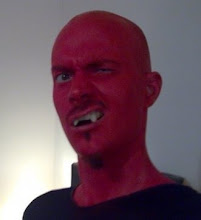One Missed Call
Takashi Miike is arguably best known in the West because of two films, Audition and Ichi the Killer. The first is a sedately paced horror that slowly drops in unnerving scenes until coming out of leftfield with a nasty finale, whilst Ichi is a gonzo gory yakuza picture stuffed to the gills with bizarre characters and more of the fetishistic imagery which Miike usually enjoys throwing at the screen, particularly when source material is on the more pedestrian side.
One Missed Call shares a lot with the run of Japanese horror films that emerged out of the success of the Ring; it shares a chain-letter set up, here using mobile phones to pass on the curse at the centre of the film.
From the start we can tell that Yumi is different from her peers when we meet her at a restaurant, quieter and more distracted than the other uni students. As she and a friend catch up her friend receives a call with a strange ringtone. The missed call results in a voicemail from her own phone, dates two days in the future and from herself ending in a chilling scream. From then on calls from your own phone foretell your death, after which someone from your contact list receives a call from themselves only to die days later and so on.
In many ways One Missed Call is interchangeable with a dozen other Asian horror films from the last decade, but the difference here lies in the execution, Miike managing to twist in elements of dread ever more frequently as the film runs with dozens of scenes ratcheting up the tension and creating genuine fear, scene after scene simply involves skin-crawling moments of the unnatural and unsettling, many with only inferred menace. One scene in a disused hospital sees ghostly hands push heavy jars of foetuses in formaldehyde through doorways into a corridor as Yumi watches - there is no explicit threat here, just the sense that things are very wrong.
One Missed Call succeeds in expanding on the generic plot in ways unexplored in subsequent examples of these types of films - for example whilst most films exist in their own bubble of reality, here news of the curse reaches the ‘outside world’ and a manic TV producer half kidnaps Yumi’s friend in order to broadcast a live show of an exorcist attempting to save her just as her voicemail was made. Much of the imagery has cropped up in other films but none have had such a wealth of oppressing dread permeate throughout, building relentlessly with no real release right up to the ambiguous climax.
One Missed Call is one of Miike’s best films and a must for any fan of Asian horror, a gem not to be overlooked and the scariest film I’ve seen in a long time.
The Devil’s Backbone
Before the notoriety that Hellboy brought, Guillermo Del Toro was critically acclaimed in the horror genre. With his debut Mexican vampire movie Cronos and the Hollywood creature feature Mimic, Del Toro proved as comfortable at the helm of arthouse genre features as he did in lala land.
A number of familiar themes crop up in the Devil’s Backbone that recur throughout Del Toro’s work - he would revisit the Spanish civil war in Pan’s Labyrinth, Spanish horror the Orphanage that he produced echoes the setting of this feature, and the fascination with mechanical devices that began with Cronos and appears here and there in the Hellboy movies, here crops up in the artificial leg on the orphanage matron.
The film is big on atmosphere, the isolation of the orphanage in the middle of sun scorched scrubland, the cavernous, sepulchral emptiness of the gloomy underground pool, the medical specimens on display in the physician’s room and the unexploded bomb in the courtyard all help to build a world where the fantasies of little boys seem closer to reality.
A resistance fighter stuck at the front fighting Franco’s fascists in 1939 sends his son, Carlos, to a remote orphanage as the tide of war turns against him. Soon after arrival the resident bully, Jaime, steals Chis comic prompting Carlos to resist, leading to a series of events ending in him meeting what the boys call “He who sighs”, there is a ghost in the orphanage.
Aside from that there are shady links to the resistance, a stash of gold bars and the angry handyman Jacinto who grew up in the orphanage and may not have returned for the most altruistic reasons. Betrayals and power plays ensue with the elderly matron Carmen and physician Dr. Casares trying to protect the boys with a little help from the other side. As befits the setting, a struggle in the face of hopelessness as the fascists are poised to take power, the film is a dark one though tends to err in favour of unearthly scares rather than gory shocks. In the end the living are more dangerous than the dead, perhaps unsurprisingly.
The film doesn’t offer enough difference to stand up as well as Cronos, and pales in comparison to Del Toro’s powerful Pan’s Labyrinth, but it’s still a good film and highlights the talent that he has as a director and will hopefully bring to the forthcoming rumoured Frankenstein and Lovecraft adaptations.


0 comments:
Post a Comment